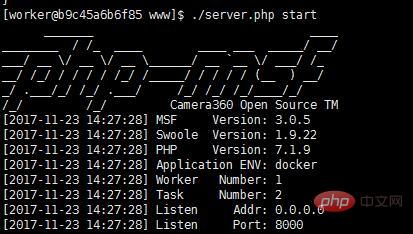
Docker is an open source application container engine that allows developers to package their applications and dependency packages into a portable image, and then publish it to any popular Linux or Windows machine, and can also implement virtualization change. Containers completely use the sandbox mechanism and will not have any interfaces with each other.

The classic LNMP (linux nginx php mysql) environment has many ready-made deployment scripts, but today when Docker is popular, many students still have some ideas on how to deploy. problem, so this article briefly introduces how to use Docker and docker-compose to deploy php applications on the server. (Recommended learning: PHP video tutorial)
Install and deploy in Docker, use its Docker image directly:
-p 2201:22 : In order to facilitate ssh login to the open port mapping of the container, it doesn't matter if you don't use it, because you can use docker exec
-p 81:8000: Mainly to map the 8000 port of the container (phpmsf default listening port), this The port can be changed, according to the changed port
-v: Mainly for the convenience of file mapping during development time, /home/worker/data/www/ is the default web file directory, according to the changed directory
$ docker run -dit --name phpmsfdemo -p 2201:22 -p 81:8000 -v /data/webroot/:/home/worker/data/www/ registry.cn-hangzhou.aliyuncs.com/pinguo-ops/php-msf-docker
php-msf image running container, php running environment
Deployment code
After the container is successfully deployed, the code can be deployed directly in the container.
The direct installation code uses php-msf-docker, which contains an installer.php. By running this file, you can directly download the framework and application directory.
For example, to enter the container, first git clone php-msf-docer, for example, I clone to the /home/worker/data folder.
$ git clone https://github.com/pinguo/php-msf-docker.git
Enter php-msf-docker, run installer.php:
$ php installer.php start
Then the installation directory and application name will be selected, and then the configuration will be successful:

It will start by default if the configuration is successful. If it does not start by default, you can enter the directory to start it manually:

Manually start it and enter the installation directory, and then run the server That’s it:
$ php server.php start
The above is the detailed content of What container is used to deploy php?. For more information, please follow other related articles on the PHP Chinese website!